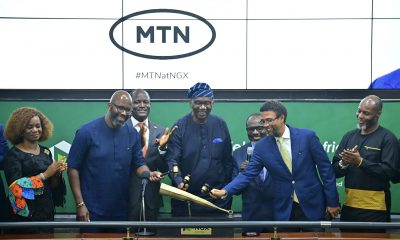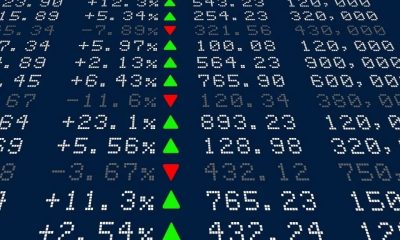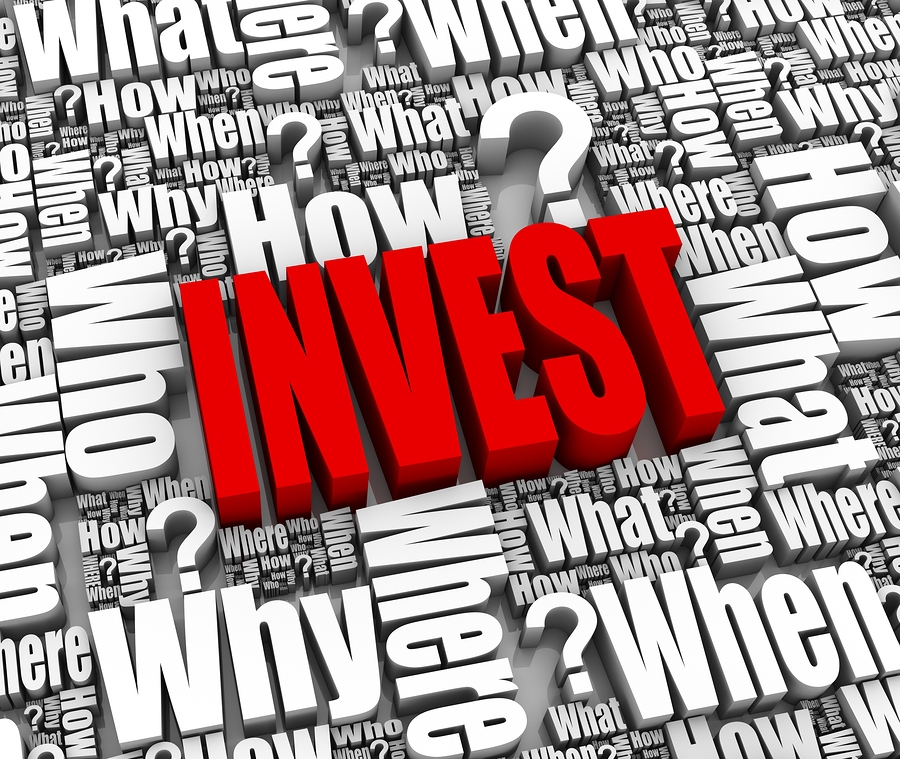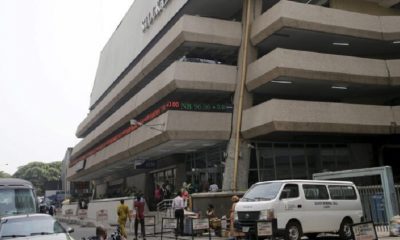Economy
Why Foreign Investors Avoid Nigerian Stocks—Omordion
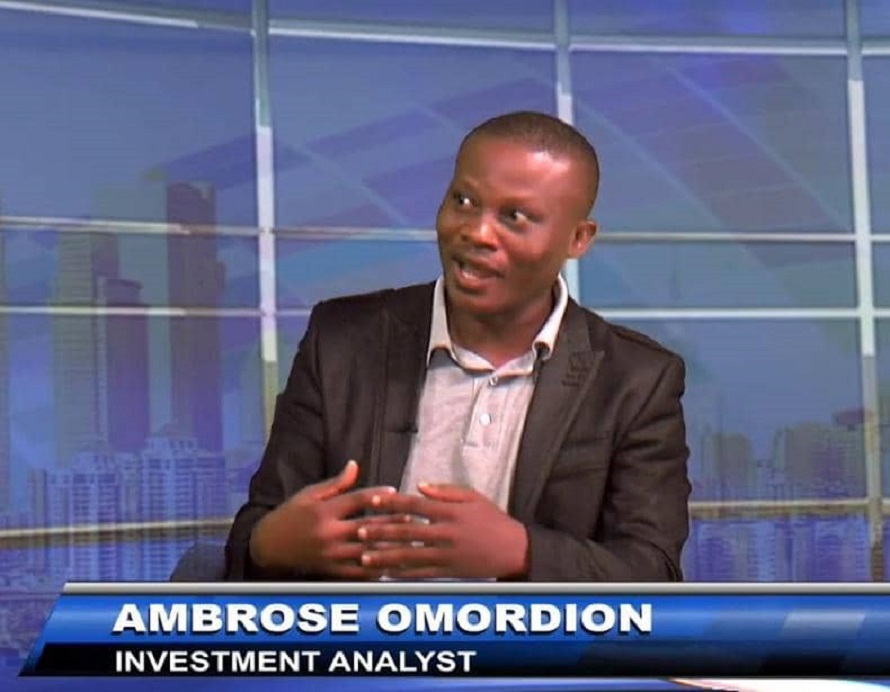
Ambrose Omordion is one of the ubiquitous experts providing deep analyses of market trends in the Nigerian capital market. He is the Chief Research Officer (CRO) of Investdata Consulting Limited, leading a team of other experts in the firm.
In this interview with a select media, the capital market guru takes a wide look around the market environment to spot lurking opportunities and risk factors for investors and the economy while hinting the government and market regulators on few tips that can help the market deliver its mandate as an enabler of economic growth. Excerpt:
What is your appraisal of what happened in the Nigerian capital market in 2020?
If you look at what happened in the market in 2020, I’ll say it is something that surprised many analysts and investors. The return was unprecedented because following the outbreak of COVID-19 in Nigeria around February 2020, the market reacted negatively and there was a lot of sell-offs in the market that dropped the market to 11-year’s low by the end of March. This was caused by panic sell-offs.
The outbreak of the pandemic also affected the oil price which fell as low as $12 per barrel, and the market also reacted to that.
But the good thing is that immediately the prices were undervalued, and there was value in the market and the price of crude oil started looking up again in April, market responded because of positive sentiments from the recovery of crude oil price. These are factors that drove the market higher especially in April.
Then, numbers that came in 2019 also supported the market recovery in April because the financial performance of most of the companies beat market expectation. Dividends were still coming and Q1 numbers for many companies were not too bad and that supported the market in April and May.
However, the market slowed down in June because of expected Q2 numbers. And despite that there was a whole month lockdown, the Q2 numbers of many companies were still above expectation. People expected that the pandemic will gravely affect performance because the lockdown led to low activities in the economy and that was reflected in the Purchasing Manager Index (PMI) for the month.
However, that didn’t affect the Q2 numbers of many companies and that also gave the market another leaf of support. Then, the crude oil price sustained its recovery and the sentiment of low interest that also affected the fixed income market was a plus for the equities market because people were seeing opportunities in the market. These are what kept the market throughout the year and positioned the Nigerian equities market for 50.034 per cent gain to close 2020. This is the same market that recorded a loss of 18.2 per cent as at the end of March. For the market to have risen by more than 50 per cent from that points means that in essence, the market even gained more than the 50 per cent.
However, our concern was that the market rally was not general or even. It was driven by very few securities and these are highly capitalized stocks that control about 70 per cent of market capitalisation and they were responsible for the gain recorded in 2020.
What direction do you see the market going in 2021 and what factors will likely give it the impetus?
Regarding the new pattern that we are seeing in 2021, we expect that vaccine discovery is going to help economic recovery in 2021 which also will have an impact on our market, knowing that our market is driven by two major things that I call: low-interest rate and oil price movement.
When you see the oil price moving up, Nigerian stocks should go up because our market responds to oil price movement since it will always impact our external reserves. Both local and foreign investors show interest in the oil price factor believing that any time it high, Nigeria will have enough money and when the price falls, the reverse is going to be the case. That’s why as the oil price appreciated and the market was in the overbought region, investors were still buying.
Secondly, the low-interest rate has been a major driver of the market. If you go back to 2006 when the then CBN governor, Mr Charles Soludo, crashed rate, the market recorded tremendous gain but since then, the market has not experienced such a low-interest rate again.
Go and check, as at 2017, the interest rate was around 15 per cent and the market was struggling. But now, it is almost around 3.2 per cent which shows that interest rate is low and opportunity funds would move into the equities market. These are the things we hope will drive the market in 2021; vaccine discovery, low-interest rate and crude oil price.
Another factor that will support all these is corporate earnings. Even when there was serious fear for the economy, companies’ corporate earnings were still positive which tells you that economic recovery is already underway.
If you are seeing corporate earnings from companies that represent different sectors of the economy and the numbers are good, this means economic recovery is underway. That is why I tell people that coming back to the growth of the economy will come around in the second quarter because the way it is going, once we see the full-year GDP by February, it we tell us how less contracted the economy is or if it has crossed positive already. Even Q1 GDP too should say something positive and any improvement in the economy will always tell on the equities market because more companies will report better numbers that will drive the prices.
However, we expect price adjustment in the market because the way the price moved from almost 20,000 index points to above 41,000 is about 100 per cent rise. We expect a little pullback.
Regardless, the opportunity in the market is that those stocks that are wrongly priced and mispriced in different sectors should be the target of investors that have a good history of dividend payment and fundamentals. But now that the trading pattern in the market has changed, you can see that the high-caps moved the market in 2020 but now the low-caps and the medium-caps are the ones gaining in this New Year. This is a sign that we are coming out of recession.
Anywhere in the world, when you see low cap stocks, medium cap stocks and dividend-paying stocks rallying, it means that those companies have expectations. And anywhere in the world, the stock market is a leading indicator that tells you whether the economy is going down or coming up.
The year 2020 witnessed lower participation from portfolio investors and local investors dominated share deals at the NSE, what does this really imply and how do you see it playing out this year?
For me, the policy of the Central Bank of Nigeria (CBN) on foreign exchange has been a major factor behind in and out of foreign investors. When they find it difficult to exit after they have made money in Nigeria, it is discouraging; or when they come in and there is a devaluation of the naira, it wipes off all their gains within that period.
The expatriates are being careful. Nigeria has different exchange rates for different people. The portfolio investors want the various rates to be harmonized. Just let there be one rate for everybody within the economy. If that is achieved and our external reserves are still up, it will attract them.
Regardless, I believe that anywhere in the world, if you depend on foreign investors, your market will not be stable for planning. In any country, the stock market is for long term investment which people can plan with.
But when foreign investors come into the market and have 80 per cent of the market when they are going, the market will start bleeding and you cannot plan with such a market. Now, the reverse is the case in Nigeria as we are seeing local investors taking big chunk of the market; it is a welcome development for the local equities market.
Also, despite the usual fear in January, the January effect did not really play out in our market this year because the market is not in the hands of those who start running once they hear a cough. Now, we have people with long term funds that are also dividend players in the market because they are pension administrators.
For me, it is a welcome development that we have less participation from the expatriate side. However, I believe that the foreign investors would come back and it would be a plus but they cannot dominate the market again like before and that would support retail investors.
With the current arrangement, the market is becoming more stable and that is what we need to plan and know that a market is a good one. For foreign investors, they are welcome anytime, but I think policy direction is what they are just waiting for.
The coming on board of new companies via IPO still remains on the low side at the NSE. Few right issues were recorded in 2020, but going forward, what do you think could be done to attract more IPOs?
It pains me that companies on the Exchange are delisting for one reason or the other. I think it is the work of the regulators to sit down and find out why companies are delisting because the economy is not fully represented in the economy. There are some sectors that are not represented on the Exchange. Anywhere in the world, if you look at the exchange of any country, it tells you how the economy is doing because it represents different sectors of the economy.
For example, it is only recently that we had the telecoms sector represented in the capital market via the listing of MTN Nigeria and Airtel Africa. We need to encourage other sectors. For me, if the cost of getting listed is what is scaring people away, then, the regulators should reduce it to encourage and retain more companies. This will deepen the market. When the market is deep, it will attract more funds; but when it is shallow, such as what people say about Ghana today that their market is shallow because they have just a few listed equities, the fund would not come.
So, we need to encourage more listings. In the United States, there more than 18,000 listed companies trading on their floor. We do not have up 200 here in Nigeria. I think we should do more and that will help the market to play its role as an economic driver because anywhere in the world, long term fund is what supports economic development and you get that long term fund from the stock market where you can borrow to expand your business. But if the market is not deep and is not attractive, it will not attract fund into the economy.
In addition, the government and the regulators should make policy that will attract more people. The fundamental issue about that is that the participants in the market are not increasing because the regulators have not performed their work of educating Nigerians on how to invest.
People that have their fingers burnt when the market crashed in 2008 and 2009 are still nursing their wounds. You need to go back and tell them that the market has changed and has become more transparent with the use of technologies.
I think that is the area where the regulators should do more. If we can have more people playing in the market, I am telling you that unemployment in Nigeria would be solved. I will say it anywhere that this market can solve the problem of unemployment in Nigeria if the government can open their mind and put enabling regulation in place. With the technologies that we are having today, youths would be engaged and when they are engaged in making money, there would be a shift away from crime. I believe our market can be empowered to play that role.
Also, if we have more companies doing well and expanding, they will employ more people. That is why I said the Nigerian capital market should be put in the right perspective so that it can adequately play its role in driving the economy and create jobs for Nigerians.
The NSE created the growth board not quite long ago. So far, how well have investors been interacting with that segment of the market?
I will say that the Nigerian Stock Exchange (NSE) and the Securities and Exchange Commission (SEC) occasionally taking journalists for training is not a bad thing. However, journalists just report. But more importantly, the people that they need to educate more are the ones on the street earning money – the entrepreneurs, the artisans, the students. If you educate them, this market would become overactive.
Those stocks that they put on the growth board include Chams Plc and a few others. I think these are not enough as growth stocks. I see growth stocks as those stocks that have a future. Even though they are still low, they definitely are going somewhere. There are many of them in the market but I continue to wonder why they have picked just the few. And does the public know about the importance of the growth stocks? That is another issue to deal with. There are many categories of stocks and the growth category happens to be a very important one in an economy such as Nigeria. A stock listed in the growth board has been in the market for years without giving dividend to investors. The company is also not going into new businesses. Now that we are in a tech world, I believe growth stocks are those ones stepping into that tech environment to grow and expand. If you are talking of stocks like Omatek, fine! It has good potentials even if it has not harnessed it. Talk of stocks like Cham, you will know they are going into a space that is full of a lot of opportunities. You do not put a stock on the growth board just because the price is low.
The year 2021 started with the national budget already signed by the President. What impact do you expect this to have on the market outlook?
Just as I said earlier, 2021 is a very mixed and dicey year in the sense that there are factors that will impact the economy positively if there is policy match. Before now, we have been having mismatch policy in the country. If we can put the best policy together this year, I believe we will make progress. The CBN is reducing the interest rate, which is good. The budget has come early as expected and you know when a country releases its budget, it helps the government and even players in the economy to plan because they can see where the economy is going.
Like in Nigeria now, we have seen the benchmark oil price for 2021. Right now, the crude oil price is above the benchmark for the 2021 budget which translates into more money for the government.
Also, if you look at the borrowing rate of the government from 2020 to 2021, it’s huge. That means the fiscal authority also have to look inwards to drive those infrastructures that will support economic growth. All this money that the government is borrowing, if it used to build our railways and develop road networks such that there is easy movement of stocks across the country at cheaper rates, inflation will not be high. It has been observed that the inflationary pressure on most of the goods emanates from the high cost of transporting them.
Now, we have seen a hike in electricity tariff and fuel price. If the government can find a way to address this, and give us active rail system that will connect the different parts of the country, goods will move with ease and prices would crash in the market. What I am saying, in essence, is that we need to harness both monetary and fiscal policies so that we can have a good 2021.
Amidst all these, what should be the right move by investors?
For investors in the market, they have to be very careful because any change in policy will directly affect the equities market. We have enjoyed the rally in the market because of the low interest in the fixed income market. Any adjustment in that area alone would change the face of the market. That is why as a discerning investor; you do not just follow all those stocks with low prices that have no fundamentals. Instead, target stocks that have fundamentals such that despite the expected change in rate, they will still be able to offer reasonable returns that will attract investors to the company.
Between now and March ending or April, we will see the most active earnings season because many companies at the exchange have December as their year-end and we will see more results; and because this is coming with rewards in terms of dividend.
For me, I think 2021, generally is a mixed year and we might see a positive performance in the first quarter. But going to the second quarter, the equities market might not be as favourable as what we have seen so far. This is because when there is any adjustment in interest rate, it is going to hit the stock market. More so, the market is ripe for profit-taking and many investors are ready to pull out to make a capital gain.
How have you been contributing to the growth of the market and wealth creation for investors?
Investdata Consulting Limited is an independent research company with a focus on the economy, quoted and unquoted companies, market research, and sector analysis and investment education, with different customised investment education products to help investors achieve their investment objectives, by making an intelligent and knowledgeable investment decision.
Investdata has developed a product and platform that can help the nation’s stock market play its role in creating jobs for Nigeria youths and wealth for investors.
We have continued to attract more participants to equity market through our investment education organised every quarter in Lagos, Port Harcourt and Abuja with an annual summit in December to position for the coming year.
What particular gap that we have noticed over the years is poor investor education. We have been doing all we can to bridge this gap with our timely analyses, trainings and platforms. What we believe is that more people will only participate in the capital market in a way that will support the economy only when they understand what is happening there.
Economy
FG Targets Credit Access For 50% Workers By 2030

By Adedapo Adesanya
The Vice President, Mr Kashim Shettima, inaugurated the Board of the Nigerian Consumer Credit Corporation (CREDICORP) and gave a 50 per cent access target for workers, saying consumer credit was critical to Nigeria’s ambition of becoming a one-trillion-dollar economy by 2030.
According to him, President Bola Tinubu established the CREDICORP to build a trusted credit infrastructure, provide catalytic capital to lower borrowing costs, and help Nigerians overcome long-standing cultural resistance to credit.
Speaking on Thursday in Abuja when he inaugurated the board on behalf of the President, the Vice President, in a statement by his spokesman, Mr Stanley Nkwocha, said that the quality of life of Nigerians cannot improve without closing the gap between access to capital and human dignity.
“A civil servant who earns honestly does not have to chase sudden wealth just to buy a vehicle, or save for ten years to buy one. A young professional should not remain in darkness simply because solar power must be paid for all at once,” the Vice President said.
VP Shettima disclosed that in just one year of operations, CREDICORP has disbursed over ₦37 billion in consumer credit to more than 200,000 Nigerians, with over half of them accessing formal credit for the first time.
The Vice President said the organisation was specifically tasked with building credit infrastructure to bridge the trust gap between lenders and borrowers, providing wholesale capital and credit guarantees through its portfolio company.
“Ultimately, these critical jobs of CREDICORP will enable access to consumer credit to at least 50 per cent of working Nigerians by 2030,” he said.
The Vice President explained that the new board’s role was not ceremonial as they are custodians of the organisation’s mission, adding that the long-term strength of the institution would depend on their “vigilance, integrity, sacrifice, and commitment.”
He directed Board members to uphold Public Service Rules, the Board Charter, and all applicable governance frameworks, warning that accountability and stewardship of public resources were non-negotiable.
The Chairman of CREDICORP, Mr Aderemi Abdul, expressed appreciation to President Tinubu for his vision behind the formation of CREDICORP and for the confidence reposed in them, noting that the establishment of the corporation marked an important step towards strengthening the nation’s financial architecture.
He assured President Tinubu that the board understands its responsibility and will guide the institution to deliver meaningful benefits to Nigerians.
For his part, Mr Uzoma Nwagba, Managing Director/CEO of CREDICORP, recalled watching President Tinubu say 20 years ago that consumer credit is one of the major tools that will improve the lives of Nigerians.
He noted that over the past 18 months, the institution has benefited more than 200,000 Nigerians, including students.
He assured that the presidential vision behind CREDICORP would not be taken lightly, as the team considers their appointments a unique, once-in-a-lifetime opportunity.
Other members of the board inaugurated include Mrs Olanike Kolawole, Executive Director, Operations; Mrs Aisha Abdullahi, Executive Director, Credit and Portfolio Management; Mr Armstrong Ume-Takang (MD, MoFI), Representative of MoFI; Mrs Bisoye Coke-Odusote (DG, NIMC), Representative of NIMC; and Mr Mohammed Naziru Abbas, Representative of FMITI.
Others are Mr Marvin Nadah, Representative of FCCPC; Mrs Chinonyelum Ndidi, Representative of the Federal Ministry of Finance; Mr Mohammed Abbas Jega, Independent Director; and Mrs Toyin Adeniji, Independent Director.
Economy
NASD OTC Exchange Rallies 0.23% as Nipco Leads Six Advancers

By Adedapo Adesanya
Six price gainers helped the NASD Over-the-Counter (OTC) Securities Exchange retain its stay in green territory after a 0.23 per cent appreciation on Thursday, February 26.
The price gainers were led by Nipco Plc, which added N25.00 to close at N278.00 per share compared with the previous day’s N253.00 per share, NASD Plc rose by N5.13 to N56.41 per unit versus N51.28 per unit, FrieslandCampina Wamco Nigeria Plc expanded by N2.24 to N102.44 per share from N100.00 per share, Afriland Properties Plc grew by 88 Kobo to N18.88 per unit from N18.00 per unit, 11 Plc increased by 35 Kobo to N277.00 per share from N276.65 per share, and Lagos Building Investment Company (LBIC) Plc gained 27 Kobo to close at N3.75 per unit versus N3.48 per unit.
On the flip side, Central Securities Clearing System (CSCS) Plc lost N1.75 to sell at N68.25 per share versus N70.00 per share, and Geo-Fluids Plc depreciated by 2 Kobo to N3.25 per unit from N3.27 per unit.
The weight of the advancers fortified the NASD Unlisted Security Index (NSI) by 9.21 points to 4,034.46 points from 4,025.25 points, and the market capitalisation soared by N5.51 billion to N2.413 trillion from Wednesday’s N2.408 trillion.
Yesterday, the transaction value jumped by 18.8 per cent to N102.8 million from N80.7 million, and the number of deals surged by 18,8 per cent to 38 deals from 32 deals, while the transaction volume went down by 84.9 per cent to 1.3 million units from 8.7 million units.
At the close of business, CSCS Plc was the most traded stock by value (year-to-date) with 34.2 million units worth N2.04 billion, followed by Okitipupa Plc with 6.3 million units sold for N1.1 billion, and Geo-Fluids Plc with 122.1 million units valued at N478.2 million.
Resourcery Plc remained as the most traded stock by volume (year-to-date) with 1.05 billion units exchanged for N408.7 million, trailed by Geo-Fluids Plc with 122.1 million worth N478.2 million, and CSCS Plc with 34.2 million units traded for N2.04 billion.
Economy
Naira Down Again at NAFEX, Trades N1,359/$1

By Adedapo Adesanya
The Naira further weakened against the Dollar in the Nigerian Autonomous Foreign Exchange Market (NAFEX) for the fourth straight session this week on Thursday, February 26.
At the official market yesterday, the Nigerian Naira lost N3.71 or 0.27 per cent to trade at N1,359.82/$1 compared with the previous session’s N1,356.11/$1.
In the same vein, the local currency depreciated against the Pound Sterling in the same market window on Thursday by N8.27 to close at N1,843.23/£1 versus Wednesday’s closing price of N1,834.96/£1, and against the Euro, it crashed by N8.30 to quote at N1,606.89/€1, in contrast to the midweek’s closing price of N1,598.59/€1.
But at the GTBank forex desk, the exchange rate of the Naira to the Dollar remained unchanged at N1,367/$1, and also at the parallel market, it maintained stability at N1,365/$1.
The continuation of the decline of the Nigerian currency is attributed to a surge in foreign payments that have outpaced the available Dollars in the FX market.
In a move to address the ongoing shortfall at the official window, the Central Bank of Nigeria (CBN) intervened by selling $100 million to banks and dealers on Tuesday.
However, the FX support failed to reverse the trend, though analysts see no cause for alarm, given that the authority recently mopped up foreign currency to achieve balance and it is still within the expected trading range of N1,350 and N1,450/$1.
As for the cryptocurrency market, major tokens posted losses over the last 24 hours as traders continued to de-risk alongside equities following Nvidia’s earnings-driven pullback, with Ripple (XRP) down by 2.7 per cent to $1.40, and Dogecoin (DOGE) down by 1.6 per cent to $0.0098.
Further, Litecoin (LTC) declined by 1.3 per cent to $55.87, Ethereum (ETH) slipped by 0.9 per cent to $2,036.89, Bitcoin (BTC) tumbled by 0.7 per cent to $67,708.21, Cardano (ADA) slumped by 0.6 per cent to $0.2924, and Solana (SOL) depreciated by 0.4 per cent to $87.22, while Binance Coin (BNB) gained 0.4 per cent to sell for $629.95, with the US Dollar Tether (USDT) and the US Dollar Coin (USDC) closing flat at $1.00 each.
-

 Feature/OPED6 years ago
Feature/OPED6 years agoDavos was Different this year
-
Travel/Tourism10 years ago
Lagos Seals Western Lodge Hotel In Ikorodu
-

 Showbiz3 years ago
Showbiz3 years agoEstranged Lover Releases Videos of Empress Njamah Bathing
-

 Banking8 years ago
Banking8 years agoSort Codes of GTBank Branches in Nigeria
-

 Economy3 years ago
Economy3 years agoSubsidy Removal: CNG at N130 Per Litre Cheaper Than Petrol—IPMAN
-

 Banking3 years ago
Banking3 years agoSort Codes of UBA Branches in Nigeria
-

 Banking3 years ago
Banking3 years agoFirst Bank Announces Planned Downtime
-

 Sports3 years ago
Sports3 years agoHighest Paid Nigerian Footballer – How Much Do Nigerian Footballers Earn


